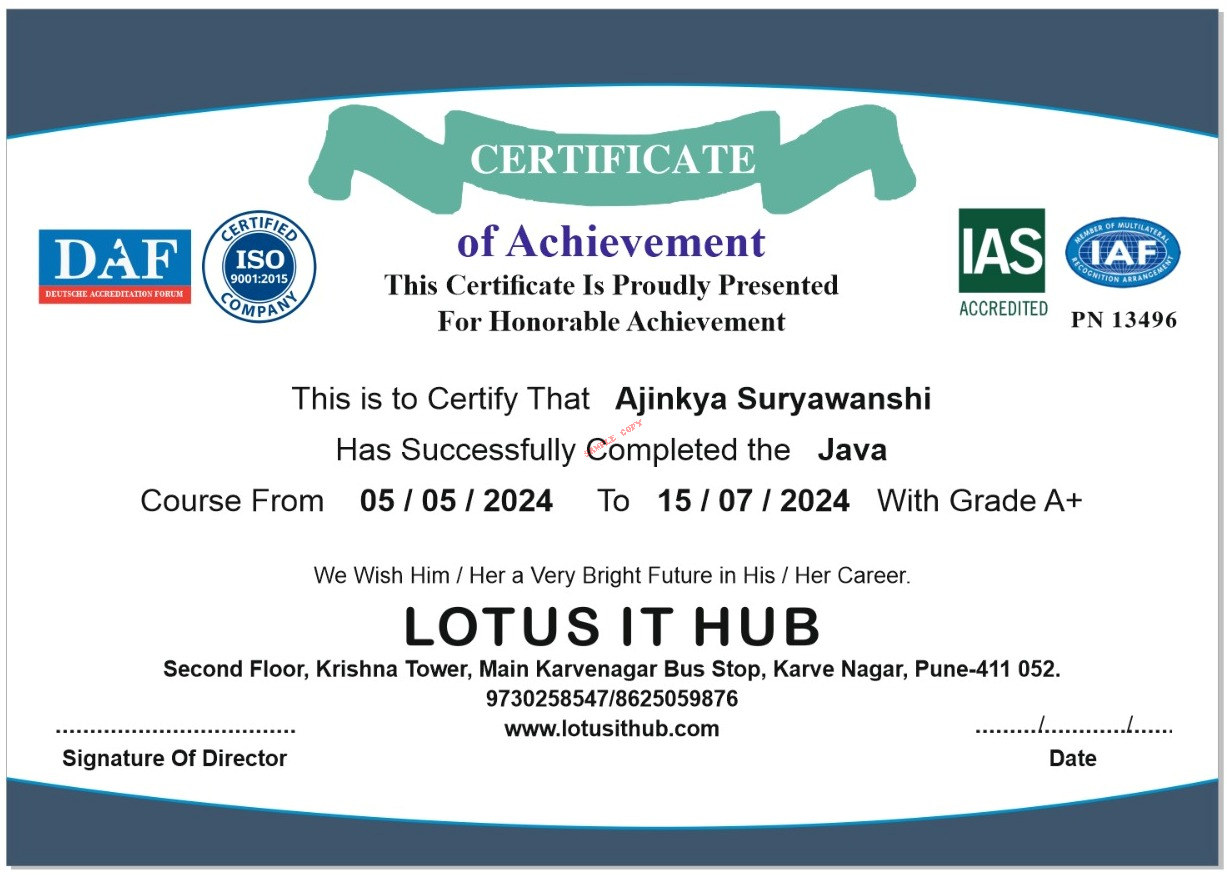Mastering PL/SQL: Advanced Programming Classes in Pune!
The powerful programming language PL/SQL is used in combination with Oracle database. As it mixes procedural constructs with SQL, makes it an essential tool for database managers and developers. Complete training in PL/SQL is provided by PL/SQL classes in Pune to assist people become proficient in database programming and master this language.
Introduction to PL/SQL
With its combination of SQL and procedural constructs, developers may create packages, triggers, stored procedures, and functions all within the Oracle Database. Block-structured language with variables, conditions, and exception handling offered by PL/SQL enables effective connection with the Oracle Database.
SQL Developer, which enables users to build, run, and debug PL/SQL programme units, is one of the usual tools included with the PL/SQL development environment. Declarative sections for variables and types, executable sections for the primary logic, and optional exception-handling sections for error management make up the particular structure of PL/SQL syntax.
PL/SQL Data Types and Variables
Date/time, character, Boolean, and numeric scalar data types are among the many that PL/SQL offers. Single values without internal components are stored using scalar data types. Multiple value composite data types, like records and collections, are also supported by PL/SQL. Records are user-defined data types that group related data items; collections are arranged sets of components of the same kind.
PL/SQL variables are declared either as global variables in a package or in the declaration section. They can have a default value initialised and are given a data type. You can choose data from a table using the `SELECT INTO` statement or apply values to variables with the assignment operator ({:=}).
Learning PL/SQL Control Structures in the best PL/SQL Institute in Pune
Basic components of PL/SQL control structures include loop statements, conditional statements, and exception handling. Conditional statements, including CASE and IF-THEN-ELSE, let you make decisions inside the code flow by branching programme execution according to particular criteria. Programming logic becomes more efficient and flexible when loop statements like LOOP, FOR LOOP, and WHILE LOOP enable code blocks to be executed repeatedly until certain criteria are satisfied. In PL/SQL, exception management offers techniques to handle mistakes and unforeseen circumstances sensitively, guaranteeing robustness and dependability in managing extraordinary circumstances that might occur during programme execution.
PL/SQL Blocks
Fundamental building blocks of PL/SQL code execution, PL/SQL blocks provide a variety of components necessary for organised and modular programming. Anonymous blocks are perfect for ad hoc tasks or fast testing since they enable code to be executed right away without being saved in the database. Functions and procedures are examples of subprograms that contain reusable code sections for certain tasks, hence encouraging code modularity and reusability.
Packages provide a rational unit for improved code structure and encapsulation by combining similar procedures, functions, variables, and cursors. Within the database environment, triggers—special kinds of stored procedures—allow the implementation of complex business logic and data integrity rules by automatically executing in response to particular events on database tables.
Learning Cursors in the best PL/SQL courses in Pune
PL/SQL uses cursors to obtain and process rows that SQL statements return. With DML commands, Oracle automatically generates implicit cursors; for greater control, programmers construct explicit cursors. Status of the cursor is indicated by cursor attributes such as {%FOUND}, {%NOTFOUND}, {%ROWCOUNT}, and {%ISOPEN}. Cursor FOR loops automatically open, fetch, and close the cursor to make explicit cursor usage easier.
Collections
Three main collection types are used by PL/SQL: Varrays, nested tables, and associative arrays (index-by tables). Associative arrays let you retrieve data using unique keys; nested tables may be stored in database columns and are unbounded; Varrays are always dense and have a fixed size.
Providing effective data processing and storage, these collections meet a range of PL/SQL programming requirements. Optimising data processing and improving PL/SQL application performance need an understanding of the differences between various collection types.
Learning PL/SQL Optimisation and Debugging in the best PL/SQL Training Institute in PunePL/SQL optimisation and debugging refers to methods for profiling and tracing, debugging tools, and performance tuning to improve code efficiency and find and fix problems. The goal of performance tuning methods is to enhance application performance generally by optimising code for speed and resource use. Debugging tools help to locate and correct PL/SQL code issues, therefore guaranteeing its dependability and functionality.
Integrating SQL with PL/SQL
Database operations in PL/SQL depend heavily on SQL integration. Within PL/SQL code, SQL queries may be executed and seamless connection with the database is made possible by calling SQL from PL/SQL. Enhancing data manipulation capabilities, retrieving data using `SELECT INTO` fetches query results into PL/SQL variables for further processing. By allowing effective data change within PL/SQL programmes, Data Manipulation Language (DML) commands like INSERT, UPDATE, and DELETE bridge the gap between SQL and procedural logic for all database operations.
PL/SQL and Oracle Database
Robust database programming depends critically on PL/SQL's interaction with the Oracle Database architecture. Effective data management and retrieval depend on one understanding its design. Because it makes access restrictions, data encryption, and safe coding techniques possible, PL/SQL improves Oracle security. A whole toolset for managing and monitoring Oracle databases, enhancing performance, and guaranteeing data integrity is offered by Oracle Enterprise Manager.
Best Practices and Guidelines for PL/SQL
Following PL/SQL coding guidelines guarantees the codebase's uniformity, readability, and maintainability. Reliability and resilience of code are increased by good error handling and exception management techniques, which also help to avoid unanticipated failure. In PL/SQL code, comprehensive documentation and comments encourage comprehension, upkeep, and collaboration among developers, hence promoting effective code management and information exchange.
PL/SQL Projects and Case Studies
Applying PL/SQL principles practically through real projects increases learning and skill development. Learners may use PL/SQL solutions to difficult problems by applying industrial challenges through real-world case studies and scenarios. Group debates and presentations improve members' capacity for critical thinking, teamwork, and problem-solving as well as for skillfully presenting solutions.
Conclusion
PL/SQL classes in Pune provide those wishing to become experts in database programming using Oracle Database a thorough educational experience. These PL/SQL courses in Pune provide participants the practical skills, real-world projects, and industry-relevant material they need to succeed in their jobs as database developers or administrators.
FAQ - Frequently Asked Questions
💬 Talk to Adviser
Get expert guidance from our experienced professionals in every field.
Skills & Tools You'll Learn
Programming Fundamentals
- Algorithms & Data Structures
- Problem Solving
- OOP Concepts
- Version Control (Git)
Development Tools
- IDEs & Text Editors
- CLI & Terminal
- Package Managers
- Build Tools
Software Practices
- Agile & Scrum
- Testing (Unit & Integration)
- Code Reviews
- CI/CD Workflows
Platforms & Technologies
- Databases (SQL/NoSQL)
- Cloud (AWS, GCP)
- APIs (REST & GraphQL)
- Docker & Kubernetes
Our Certifications
Gain globally recognized certifications that validate your skills and boost your career.
Earn Your Achievement Certificate

After completing your course, you’ll receive a verified certificate from Lotus IT Hub, showcasing your mastery of industry-relevant skills. This certificate can be shared on LinkedIn, added to your resume, and helps you stand out in the job market.
- Globally recognized certificate
- Verification ID for authenticity
- Downloadable digital format
- Shareable on LinkedIn & portfolios
Why Choose Lotus IT Hub
Empowering your career through expert training
Affordable & Customized Programs
Flexible pricing and learning plans
Hands-On Project Learning
Real-world practice to boost your skills
One-on-One Mentorship
Personalized guidance from industry experts



